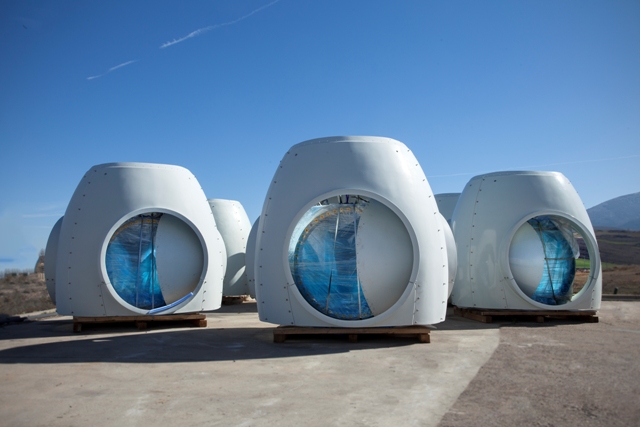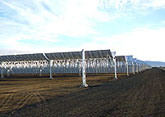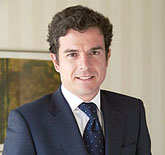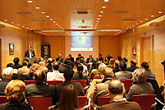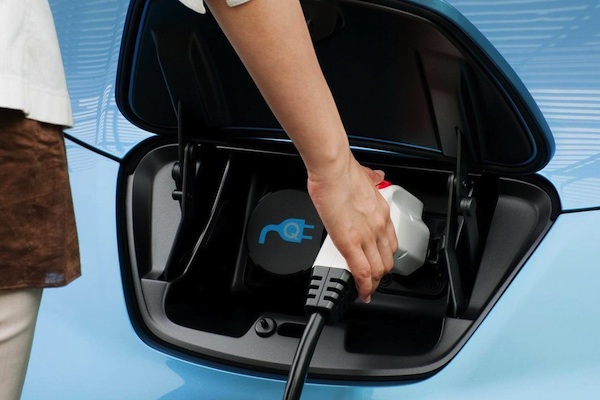In this article, Sara Pizzinato, head of Greenpeace´s Renewable Energies Campaign says that the Government is exploiting the lack of international electricity interconnections as an argument to cover up its lack of climate ambition and to introduce clauses that enable it to breach with impunity the international commitments in renewables and energy efficiency.
Ten years ago we were called alarmists when we illustrated what scientists predicted about the impacts of climate change on Spanish landscapes. Today it is frightening to see how similar these images are to the real ones. Indifference has resulted in an alteration of the environments in which we live and that we love so much so that they resemble more and more to the alarming images that we published ten years ago.
The images of today and yesterday invoke the whole world before indifference or indolence, especially those with public responsibilities. Climate change is the biggest environmental and economic problem facing mankind. And despite this, the Spanish Government says it is championing the fight against climate change but when it comes to the crunch, it does the opposite.
We are seeing this in the international negotiations on EU´s “Clean Energy for All Package”. Not only is it not supporting the need to improve renewable energy and energy efficiency targets by 2030 to be truly aligned with what was promised at the Paris Summit, but it also continues to advocate for these objectives not be binding.
Lack of climate ambition
For that matter it takes refuge behind the alleged lack of international electricity interconnections and uses the opportunity to try to introduce clauses that allow it to violate with impunity the international commitments on renewables and energy efficiency in case the electrical isolation of the Iberian Peninsula is not improved. It even defends the right to continue to subsidize the most polluting energies such as coal with consumers’ money.
It is not what is expected of a government that declares itself committed to the fight against climate change. While it is true that a certain level of interconnections increase would help to integrate a greater proportion of variable renewable energies into the European electricity system, it is equally true that even if Spain were an energy island, a 100% renewable energy system would be technically possible and economically viable.
[Pullquote] «A 100% renewable, efficient and smart energy system would cost in year 2050 only a tenth part of a scenario in which the consumption of the so-called dirty energies is maintained » [/ Pullquote]
What is more, at Greenpeace we have demonstrated that in 2050 a 100% renewable, efficient and smart energy system would cost only one tenth of the amount in a scenario in which we continue to maintain the consumption of the so-called dirty energies. Any option is technically and economically better than keeping on delaying fossil fuels and nuclear energy discontinuation as per the Government of Spain´s intention: a 20 years delay in undertaking the energy transition needed to save the climate would lead to a cost 2 times higher compared to an accelerated transition.
It would also have devastating effects on the environment and human health. Does the Government not have a duty to guarantee constitutional rights to a healthy environment and to health protection? Neither by the interests of other sectors that are affected by the same?
Minister Nadal defended in his last appearance before the Energy Commission of the Congress that without interconnections it would cost us an additional 1.2 billion euro to introduce higher quotas of renewables in Spain. However, he does not talk about the $ 38 billion a year we are facing due to the negative health impacts of burning fossil fuels that it supports or the $ 47 billion a year that climate change will cost us.
Mister Minister, there are things that cannot be paid with money: health and the environment are among them. Subordinating the ambition of the fight against climate change to the level of interconnections is an irresponsible decision that delays, hinders and increases the cost of the energy transition and the fight against climate change. Sara Pizzinato
Responsible for Greenpeace´s Renewable Energies Campaign
Carlos Sánchez Criado
Publicista por la Universidad Complutense. Director comercial de publicaciones técnicas del sector de la energía durante doce años. Director de Energy News Events, S.L. desde 2012 difundiendo información en Energynews.es, movilidadelectrica.com e hidrogeno-verde.es. Y por supuesto, organizando eventos como VEM, la Feria del Vehículo Eléctrico de Madrid.










